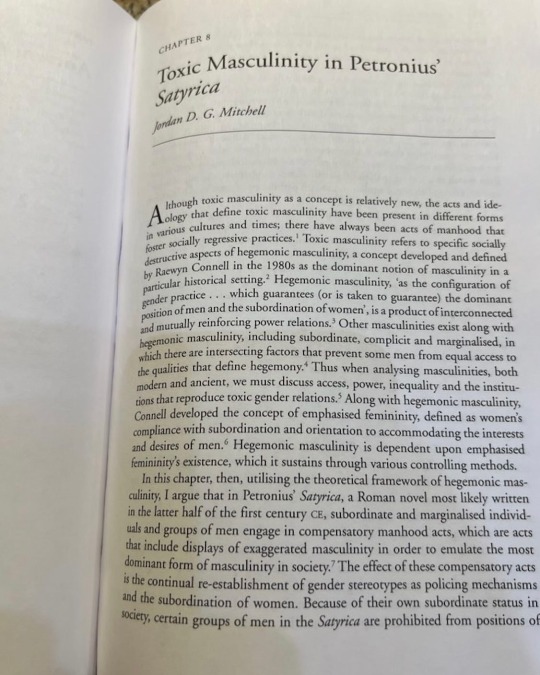Text
I am now in the period of my academic journey when I’m a little over a month away from finishing my PhD dissertation, I’ve got about 30-40 academic/post-doctoral/research fellowship rejections under my belt, and a pessimistic outlook for getting an academic job for the Fall 2024 semester.
What a great time. Living in the present because the future sure doesn’t look promising.
3 notes
·
View notes
Text
high school is soo funny in hindsight. the entire time you're there thinking it's the most important period of your life and then the second you're out you're like well that was fucking stupid
171K notes
·
View notes
Text
There's two things a knight should serve
His heart on a silver platter to the maiden that never loved him back
Cunt.
20K notes
·
View notes
Text
All aspects that add to my argument about Petronius’ Trimalchio using the first princeps as his primary exemplum for imitation. But which of the two was doing the performing?
honestly augustus was the funniest guy to end up being the first emperor of rome. he wore platform shoes to make himself look taller. he made vegetable-based puns and quips. he used to call the poet horace "penis" as a nickname. this is the man who defeated mark antony and gained sole power over rome
753 notes
·
View notes
Text

guy sitting by a fire
in a manuscript of jean de wavrin's "anciennes chroniques d'angleterre", flanders, c. 1470-90
source: Paris, BnF, Français 75, fol. 198r
17K notes
·
View notes
Text
Octavian/Augustus, the Cinaedus, and Pantomime: The Performer Part I
Nearing death, Augustus directly alludes to his performance as princeps at last breaking character asking those gathered around him whether he played the mime well (Suet. Aug. 99.1), but not before calling for a mirror to arrange his hair and fix his sagging jaw, clearly still seeking his audience’s approval. Through comic quotation, Augustus places himself in the low-status position of the actor revealing that even on his death bed the princeps attempted to control his public persona while also seeking a judgement from his audience on his performance. This scene shows how important control is to Augustus as he attempts to shape “perceptions of his life and rule” at his final moment. Even after his death Augustus’ performance persisted through his Res Gestae in a continued attempt to shape the reception of his legacy.
Augustus is unique as a performer because of his public transformation: Octavian became Augustus and continued to play that role until his death. Octavian’s metamorphosis was a reality that he played straight with no hint of irony and with no acknowledgment that the character he created was indeed an artificial construct. The principate itself was in essence an elaborate act of political ‘make-believe’ occurring within a period of time when the theatrical was the specific form of expression. Perhaps it should not be surprising, therefore, that Octavian/Augustus is explicitly compared to a cinaedus in an anecdote in Suetonius (Suet. Aug. 68). Both the figure of the cinaedus and Octavian/Augustus combine a peculiar and unsettling mixture of control and expertise and a lack of bodily and even ethical restraint. The cinaedus as a figure of excess is also a master of self-control shown by their skill, much like Octavian/Augustus who in Suetonius’ account is not a moderate figure as concerns his desire and self-fashioning and yet he exploits his excess for political gain thus showing his self-control.
From the very beginning of his public career Octavian revealed his dependence on organized theatrics, theatricality, performativity, and pretense in general.
7 notes
·
View notes
Text
Octavian/Augustus, Pantomime, and the Cinaedus
In an ongoing effort to connect Octavian/Augustus and the Roman figure known as the cinaedus––an idea introduced by Tom Sapsford in his book Performing the Kinaidos––I have been working on Octavian/Augustus' influence on the theatrical arts as well as his displays of theatricality and performativity. Augustus had a monumental impact on Roman performance art by introducing the genre of pantomime to Rome in 23/22 BCE, which went on to become one of, if not the most, popular theatrical genre.
Pantomime, which involved a single performer, emphasized storytelling through intricate dance, gestures, and poses to the accompaniment of music, both choral and instrumental, and sometimes included a spoken narrator. The performer's ability to easily transcend gender by seamlessly transitioning between male and female masks along with the movement of their bodies, which often included a powerful sensuality and eroticism, made pantomime a risqué genre. The costume of pantomime performers increased their aura of beauty and feminine seductiveness. They wore an ankle length silk robe fringed with long sleeves covered by a scarf or mantle (pallium) which the performer manipulated to represent an endless variety of forms. Pantomime dress became associated with the performers themselves, not their characters, and given the feminine nature of the costume, they were seen as effeminate. Pantomime performers, therefore, were dangerously androgynous and engaged in an activity that many elite writers saw as inappropriate for a Roman man, impassioned dancing.
How much commonality exists between cinaedi and pantomime performers? Both were perceived as competitive, attractive, effeminate, temperamental, and skilled at blurring the line between imitating and becoming. The cinaedus is a liminal figure who disturbs the set boundaries between traditional dichotomies by not embodying a stable characterization in a variety of social categories. Cinaedi, although traditionally associated with homoeroticism, engage in heteroerotic behavior as well, again defying sexual categorization They are often associated with effeminacy both in attire and comportment, however they are frequently described as being active not passive. In Roman literature, there is a common stereotype connecting the cinaedus with a willingness to be anally penetrated, but even here it is an active desire that separates the cinaedus from the pathicus; as active seekers of pleasure, they are often aggressors. It is their ludic nature that makes cinaedi masters of artifice, often confusing categories such as “real” and “performed”. The cinaedus through being an expert at performing normativity, exposes the artificiality of norms.
How does all this connect with Octavian/Augustus? Stay tuned to find out. :)
9 notes
·
View notes
Text
From 43 BCE onward Octavian/Augustus did not speak in the senate, to the army, to the public, or even to individuals in private––including his own wife––without having written something beforehand and often reciting directly from a little book. Thus he was always reading a script "lest he should say too much or too little on the spur of the moment" (ne plus minusve loqueretur ex tempore, Suet. Aug. 84). This anecdote says much about Octavian/Augustus' character, that he could not trust himself to speak in moderation.
20 notes
·
View notes
Text
Although we can associate theatricality with both Augustus and Nero, I would argue that performativity as it is defined by Judith Butler is an Augustan phenomenon. As Butler states: “Performativity must be understood not as a singular or deliberate ‘act,’ but, rather, as the reiterative and citational practice by which discourse produces the effects that it names." In other words, the performance gains its authority not in and of itself but by its appeal to––and repetition of––precedents that are often nothing more than “sanctioned fantasies, sanctioned imaginaries…elevated as the parameters of realness.”[1] Citationality, then, becomes the locus of authority most often found in “an irrecoverable past.” Whether or not that past existed in any real sense is irrelevant and thus can be created in the present to then cite as law.
The connection between Augustus and performativity can be seen most clearly in the Res Gestae Divi Augusti in which Augustus normalizes his past actions––many of which were untraditional or even illegal––by rewriting them as being exempla of traditional Roman moral conduct. The end result of the Res Gestae, as Melanie Racette-Campbell argues, is that Augustus becomes the definitive model of moral character through an act of citationality that is a ruse, “a dissimulation whereby the prior authority proves to be derived from the contemporary instance of its citation.”
[1] Butler 1993, 89. Cf. 171: “Importantly…there is no power, construed as a subject, that acts, but only, to repeat an earlier phrase, a reiterated acting that is power in its persistence and instability. This is less an ‘act,’ singular and deliberative, than a nexus of power and discourse that repeats or mimes the discursive gestures of power.”
#tagamemnon#Augustus#Octavian#Judith Butler#Performativity#Roman History#Classics#Nero#theatricality
8 notes
·
View notes
Text
As late as the fourth century CE in a satire attributed to the emperor Julian, Octavian (the later Augustus) is described as “changing many colors, like a chameleon: becoming now pale and now red”. In the satire, the god Silenus reacts to seeing Octavian by saying, “Bless me, what changeable beast is this! What terrible thing will he do to us!”
For comparison we have Pliny the Elder's comment on chameleons from his Natural History 8.120: "And [the chameleon] is more miraculous for the nature of its color, for it constantly changes its eyes and tail and entire body, and always resembles whatsoever it touches last, except red and white”
Pliny’s mention of the chameleon’s inability to turn “red and white” (rubrum candidumque) makes Julian’s description of Octavian turning pale (ὠχριῶν) and red (ἐρυθρὸς) take on a greater significance because it shows that Octavian is then more skilled than a chameleon at changing color by possessing the capability to turn both red and white.
Although Silenus' comment makes it clear that Octavian's color-changing should be seen as a reflection of his instability and danger, the change in color could also be an allusion to Octavian's constant change in health as ὠχριῶν refers to becoming pallid. Pliny further strengthens this reading by writing that when dead, chameleons are pale (defuncto pallor est). Thus Octavian is constantly changing between a state of near-death and great vitality as implied by Julian's ἐρυθρὸς and Pliny's rubrum, both of which can mean having a ruddy complexion.
#tagamemnon#Octavian#Augustus#pliny the elder#Julian the Apostate#Roman history#Latin literature#Ancient Greek
228 notes
·
View notes
Text


I’m excited to announce that this is coming out December 31st with the University of Edinburgh Press! I am glad to be a part of this project and I think this first-of-its-kind book will be of great interest to a lot of people.
#tagamemnon#toxic masculinity#masculinity#ancient#toxic masculinity in the ancient world#ancient history#ancient literature#me#petronius#Satyrica#satyricon
16 notes
·
View notes
Text
The issue with Elagabalus is the source. While Cassius Dio is a contemporary who was alive during Elagabalus' reign, he was also living and writing during the reign of Elagabalus' successor, Severus Alexander. Severus Alexander made Dio a consul for a second time, so we know that Dio had a vested interest in depicting Elagabalus in a particular way that would make him look horrible from a Roman perspective while making Severus Alexander look like a restorer of order and tradition. This makes it extremely difficult to believe what Cassius Dio writes about Elagabalus.
However, we have another source: Herodian. Herodian, also a contemporary, depicts Elagabalus' as a strict devotee of Elagabal. His effeminacy comes from how he chooses to follow Eastern customs over Roman ones. Elagabalus' dresses like an Eastern priest, he wears heavy make-up, he dances, plays the drums and the flute, in fact, it is almost certain that Romans would have seen Elagabalus' as a cinaedus based on his self-fashioning. Herodian shows Elagabalus marrying three different women in quick succession and writes nothing about his being a bride to a man. In fact, the only area where Cassius Dio and Herodian seem to diverge is concerning Elagabalus' sexuality. While Cassius Dio goes into great detail about Elagabalus' desire to play the passive role, his desire to be called a woman, and his desire to physically become a woman, Herodian mentions none of this. Herodian does mention Elagabalus' self-circumcision, which he attributes to his religious belief as a follower of Elagabal.
On a more general note, the charge of effeminacy was a common accusation in Roman political invective. This mostly consisted of implying that your political enemy took the passive role in anal sex. The accusation of passivity was akin to being called a woman because within the Roman mindset the passive role in any form of sex was reserved for women or young boys. Cicero often accused his political enemies and individuals that he prosecuted of actively seeking out or enjoying being penetrated.
However, we do not see a lot of Roman invective where men are flat out called women. One example where that did happen, was when someone called Julius Caesar a woman, according to Suetonius, and oddly, Caesar did not refute the charge, which was the normal thing to do when accused of effeminacy. Instead, Caesar doubled down and responded saying that "Semiramis [legendary queen of Assyria] too had been queen in Syria and the Amazons in days of old had held sway over a great part of Asia" (Suet. Jul. 22.2). If Caesar is a woman, then he will be the kind that rules and conquers.
While the Romans have nothing equivalent to trans-identity, they would possibly understand the concept of a change of sex. There is evidence for this in Catullus 63 which is poem about the self-castration of Attis within which Catullus uses male pronouns before the castration and female pronouns after. The self-castration of the Galli, the priests of the goddess Cybele, in the Roman mindset, made them more akin to women than men, which is why they became stereotyped as effeminate figures in Roman literature. The cinaedus, an effeminate figure both because their association with a type of dance that involved shaking their ass and because of the stereotype that they actively sought out being anally penetrated, was also a gender-bending individual.
This post is simplifying a much more complicated and complex set of ideas concerning Roman gender and sexuality. Nevertheless, the point is that historical context matters a great deal when it comes to ancient sex and gender.
that feeling when you know people are gonna get froth at the mouth angry when you point out that ancient Romans loved to call their political opponents women to make them look bad and that this evidently doesn't make said political opponent a woman, because nuance and actual knowledge are fucking dead and somehow blatant revisionism is A-OK when it comes to either ancient history or gender fuckery, but you're still going to point it out.
swear to god it's still fucking revisionism if it matches "the good kind" of social politics. people will fucking believe anything if it matches up with their own worldview. none of you are immune to propaganda, clearly.
#elagabalus#tagamemnon#Cassius Dio#Herodian#Roman history#sex and gender#ancient sex and gender#classics#ancient rome#Suetonius#Cicero#Catullus
152 notes
·
View notes
Text
According to Suetonius Jul. 22.2, when Caesar was given the proconsulship of Transalpine Gaul, he basically exclaimed in the senate house, “suuuccck my diiicckk!”
62 notes
·
View notes
Text
Two more examples of Trimalchio's vulgarity that we can explain through religious/superstitious recontextualization.
Trimalchio's boy-favorite (deliciae), Croesus, described as an elderly boy (puer vetulus) with inflamed eyes (lippus) and uglier than his master (domino...deformior). On first glance we interpret the appearance of Trimalchio's boy-favorite as just another instance of Trimalchio misunderstanding what a deliciae represents as most are chosen for their beauty. However, as one scholar points out, some Romans chose ugly or deformed enslaved people for their apotropaic power because their physical appearance could repel the evil eye. That Trimalchio chose this particular boy as his deliciae shows his worry which is consistent with his overall superstitious nature.
The second example is Trimalchio's insistence that everyone at the dinner should feel free to fart. Once again, what on first appearance seems a vulgarity, at which even our protagonist laughs, audible farting was considered to have an apotropaic effect similar to laughter because of its involuntary nature. This might explain why Trimalchio attempts to persuade everyone that their physical health is in jeopardy if they don't fart!
Trimalchio does everything in his power to ward off some perceived threat. This perhaps goes hand-in-hand with his constant focus on death. The two examples above can also be seen as emphasizing Trimalchio's humble nature, a continuation of a theme I have touched on before.
#tagamemnon#lingua latina#petronius#latin language#satyricon#satyrica#Trimalchio#just dissertation things
3 notes
·
View notes


